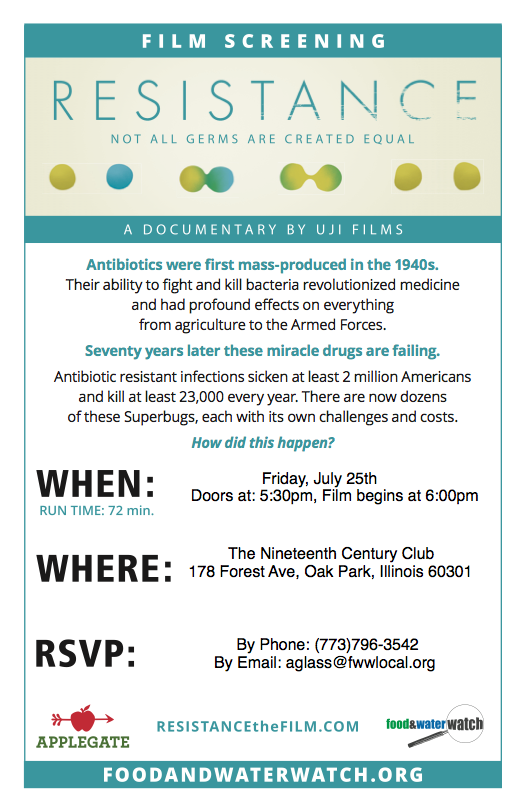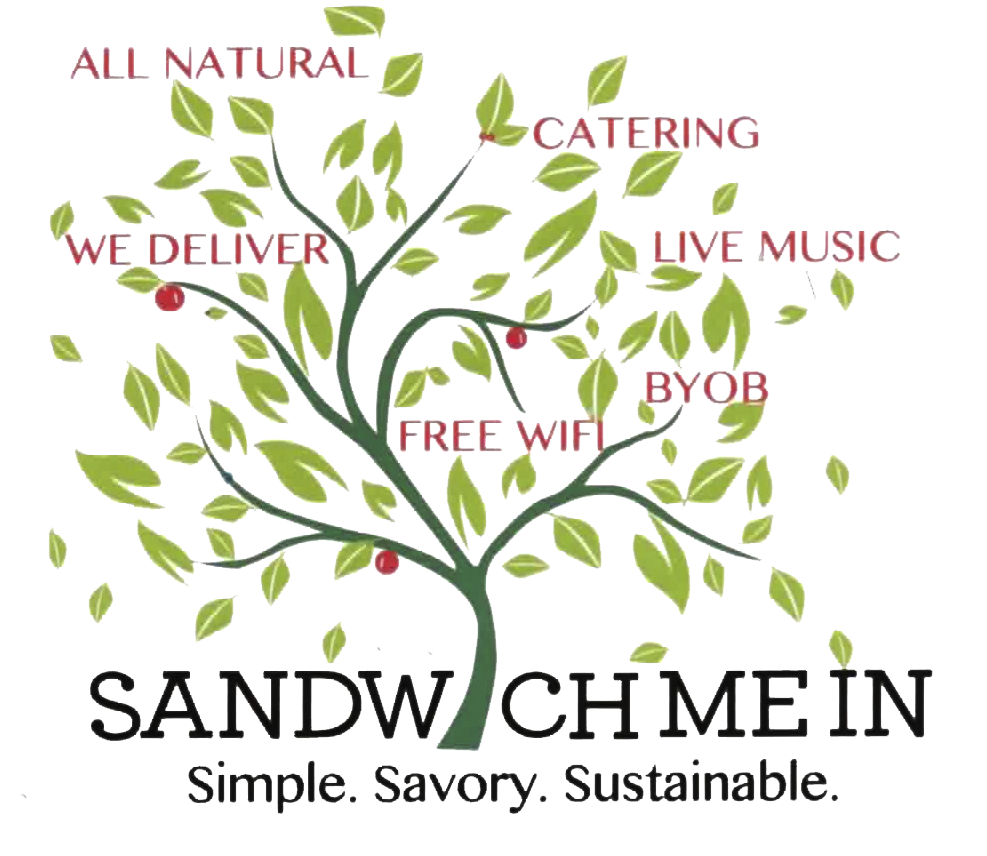The Chicago Green Festival at Navy Pier, October 24-26, attracted thousands of people looking for inspiration in green living. It's one of the biggest events of its kind in the nation. If you went, we hope you visited the One Earth Film Festival booth, featuring a social media-inspired #Earthgram photo booth, a "Vote for a Trailer" screening station, and ample resource guides to promote the festival and Green Community Connection events and activities.
Green Drinks Series: Steps Toward a Sustainable Future: Energy, Food & Water
Film Screening: Resistance -- Not All Germs are Created Equal
Community Profile: Justin Vrany, a Chicago restauranteur who takes zero-waste literally
Justin Vrany knows about the power of publicity, and the strength of the “green” movement. He opened his Chicago restaurant, Sandwich Me In, two years ago with a commitment to zero waste and to sourcing local, organic food. Despite a loyal customer base and favorable reaction to his delicious offerings, business was so slow that he found himself unable to pay employees and running the restaurant single-handedly for nearly six months last year. Then NationSwell produced a short documentary about the restaurant recently (click "continue reading" below to see video). The documentary shows how Sandwich Me In is truly a zero waste restaurant. It has been widely viewed—over 130,000 views within the first several weeks—and has also sparked a series of articles in prestigious on-line and print publications (CBS News, the Huffington Post, Chicago Tonight and others).
And with the publicity have come customers! Now the restaurant is thriving and Justin is finding the time to start other initiatives, such as a local composting program where customers can bring their own compostables to the restaurant, and live music at the restaurant most evenings. He’s also been approached by other restaurants wanting to know how he does it, and is considering starting a consulting business to teach other restaurants how to incorporate zero waste principles.
Many of us use the term “zero waste” to mean reducing our landfill waste, but at Vrany’s restaurant zero really means zero. While most restaurants discard dozens of gallons of waste per day, or even per hour, in its two years of existence, Sandwich Me In has recycled or composted all but eight gallons of its waste—which is itself largely plastic-lined coffee cups and the like brought into the restaurant by its customers (photo at right). And even these eight gallons have been taken by a local artist to turn into a sculpture! Vrany tried to cancel garbage pickup, but the city wouldn’t let him, insisting that the restaurant pay at least the minimum $40 a month for trash pickup it doesn’t use.
Sandwich Me In is a proud member of the Green Chicago Restaurant Coalition, and its commitment to sustainability doesn’t end with eliminating waste. Vrany refuses to buy overly processed or transported foods for the restaurant. Instead, nearly all of the food served by the restaurant is made in-house from scratch, using organic meats, dairy and produce from local farmers. (This year, Alex Poltorak’s The Urban Canopy will grow fresh produce for the restaurant in a dedicated Englewood plot so that food picked that day will be on the menu.) The restaurant also uses 100% renewable energy and is committed to water-conserving techniques. The restaurant’s furnishings and equipment are nearly all reused or refurbished—Vrany even ingeniously used the pallets from an appliance delivery to build out the restaurant’s behind-the-counter area!
Vrany began working in the restaurant industry at a young age, for powerhouses such as The Ritz and Nick’s Fish Market. He later attended the business and culinary arts program at Kendall College, where he learned about sustainability. Vrany credits a French teacher’s Food Politics course for changing his life, opening his eyes to what the U.S. is doing to its food and the planet. Vrany says that one of the many inspirational quotes painted on the restaurant’s walls sums up the way in which he lives his life: “Every time you spend money, you’re casting a vote for the kind of world you want” (Anna Lappé, Small Planet Institute).
Justin Vrany, Sandwich Me In, 3037 N Clark St, Chicago, IL 60657, (773) 348-3037
Food, Too Good to Waste: Reduce waste and save money!
 Americans waste as much as 25% of all food and beverage purchases. Oak Park households are being sought to participate in a free, two-month program to learn how to support sustainability and save money by not wasting food. The program, entitled "Food: Too Good to Waste," is sponsored by the Village of Oak Park, the USEPA and Seven Generations Ahead, a local organization that promotes ecologically sustainable and healthy communities.
Americans waste as much as 25% of all food and beverage purchases. Oak Park households are being sought to participate in a free, two-month program to learn how to support sustainability and save money by not wasting food. The program, entitled "Food: Too Good to Waste," is sponsored by the Village of Oak Park, the USEPA and Seven Generations Ahead, a local organization that promotes ecologically sustainable and healthy communities.
Participants will learn to save money by shopping smarter, keeping fruits and vegetables fresh, eating what they buy and composting what they cannot eat. A household of four is projected to save $30 a week by using the program's toolkit.
To sign up or learn more, call 708.660.9909, ext 7, or email Jennifer@sevengenerationsahead.org.
Author Jeanne Nolan is coming to Oak Park Library
Jeanne Nolan, the founder of The Organic Gardener Ltd., has designed and cultivated more than 650 farms and food gardens in and around Chicago—in downtown parks, public school yards and inner-city shelters, on restaurant rooftops, townhouse terraces and suburban estates, even in the mayor’s back yard. Nolan, also the designer of and project manager for The Edible Gardens at Chicago's Lincoln Park Zoo—is part of a nationwide initiative urging us to change the way we think about our food. Jeanne Nolan will come to the Oak Park Public Library on Wednesday, April 2, at 7 p.m. to talk about her book, FROM THE GROUND UP: A Food Grower's Education in Life, Love and the Movement That's Changing the Nation. An engaging blend of how-to, manifesto and memoir, Nolan shows us that it has never been easier to grow the vegetables we eat, regardless of whether we make our home on a rural farm, in a city, or in the suburbs. At a time when more Americans than ever before are cooking healthy food from scratch, Nolan is taking the movement to the next level and teaching and inspiring us to grow healthy food. The program is free and open to the public. The Book Table will have books for sale and signing.
Green Living: Warm Up Your Winter by Eating Local
Win, Win! Eat Local and Heal the Planet. In his book Deep Economy, environmentalist Bill McKibben points to the resettling of America's farms as one of the keys to invigorating strong local economies that will heal the planet. That process is well underway as young farmers are increasingly returning to the land. Organizations like Family Farmed and The Land Connection are supporting them. And films like Growing Cities and Urban Roots--two documentaries featured in next month's One Earth Film Festival--are chronicling the rise of urban agriculture.
Today, it's getting easier to participate in the local eating culture that's being created. By doing so, you'll promote not only your own health, you'll be supporting local jobs and reducing the amount of fossil fuel used to ship your food around the world.
So how do northern Illinoisians eat local in the middle of winter? Here are some ideas:
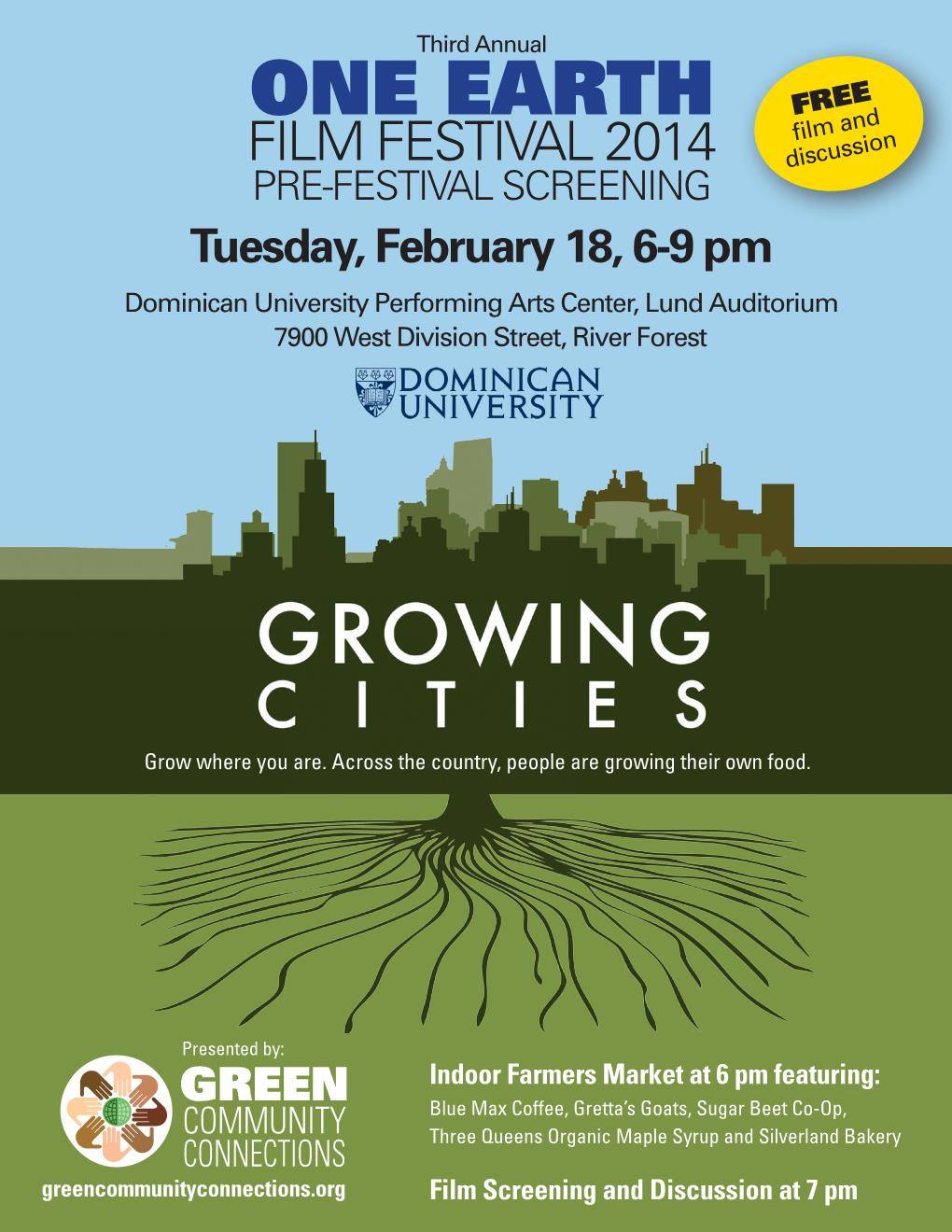 Seek out local farmers markets: Even in the deep of winter, local organizations are holding indoor farmers markets. Dominican University in River Forest is sponsoring a mini-market on February 18 at 6 p.m. Stay for a film screening of Growing Cities from 7 to 8 p.m. After the film, find inspiration by meeting local farmers who are building Chicago’s urban agriculture and community garden movement. Local congregations are also hosting Winter Farmers Markets including Euclid Ave United Methodist, on February 15th and West Suburban Temple, on April 6th (see calendar for details).
Seek out local farmers markets: Even in the deep of winter, local organizations are holding indoor farmers markets. Dominican University in River Forest is sponsoring a mini-market on February 18 at 6 p.m. Stay for a film screening of Growing Cities from 7 to 8 p.m. After the film, find inspiration by meeting local farmers who are building Chicago’s urban agriculture and community garden movement. Local congregations are also hosting Winter Farmers Markets including Euclid Ave United Methodist, on February 15th and West Suburban Temple, on April 6th (see calendar for details).
Subscribe to a Community Supported Agriculture program (CSA): Tomato Mountain Farm delivers to Chicago and surrounding suburbs biweekly in the winter. Think hoop-house-grown spinach, fresh-from-the-farm eggs, jarred tomato sauce, frozen berries and sturdy root vegetables. Most CSAs are accepting applications for spring or summer subscriptions. Sign up now to ensure your spot. See The Local Beet's CSA listings.
Grow herbs in a sunny window: A few packs of seeds, soil, and a sunny window, and you've got pesto in a few weeks! And think...planting season is just a few months away.
Support local food artisans: What do you get when you take handmade sausage from Big Guys and add fresh baked bread from Red Hen? Lunch, local style!
Enjoy a meal out: Chefs are experimenting with the tastes of heirloom foods and sustainably grown meats...the results are amazing! In Oak Park, try Eyrie, which presents seasonally inspired cuisine made from ingredients from local farmers and vendors. Marion Street Cheese Market also focuses on sustainability. And some restaurants in the Chicago area feature a farm to table concept.
Eat seasonally: Eating what the local climate produces now (or, more strictly, last fall and stored through winter) challenges your cooking skills. And this time of year, when the wind howls and the snow piles up, seasonal recipes are as warm and comforting as you'd hope. Think rich, sweet caramelized onions. Creamy potato soup. Maple-glazed squash.
Join the Sugar Beet Co-op: Oak Park and the surrounding communities will enjoy a new local eating resource in 2015 when the Sugar Beet Co-op moves into its new space. In the meantime, the Co-op is looking for members. Consider supporting this exciting effort! www.sugarbeetcoop.com
Learn more about eating local at Green Community Connection's Food Page.
One Earth Film Profile: GMO OMG
by Cheryl Muñoz
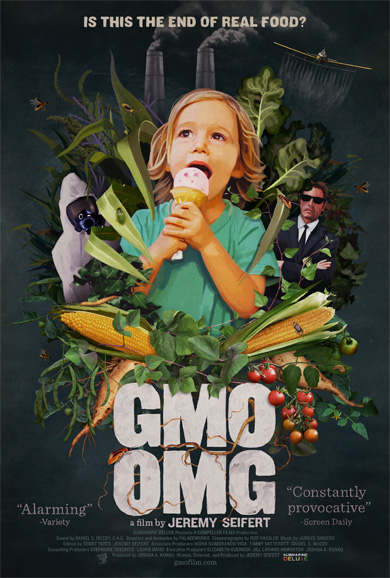
Stories are all around us, but a good storyteller pulls us in to listen closely, to be moved and most importantly to be changed by what we hear. Our appetite for transformative stories is as endless as our basic human need is to find patterns in life that enlighten us and give us hope.
In my work with The Sugar Beet Co-op and Schoolhouse, I am constantly reminded of the challenges that face our environment, our farmers, and our neighbors as we try to navigate and heal a broken food system. The stress can be overwhelming. Stories, though, have a way of isolating my insecurities and allowing me to be free of struggle long enough to regain my bearings so that I may engage again with new vitality.
My favorite film selection for the 2014 One Earth Film Festival is GMO OMG for the simple reason that it made me happy.
Continue reading more of Chery'ls review of GMO OMG.
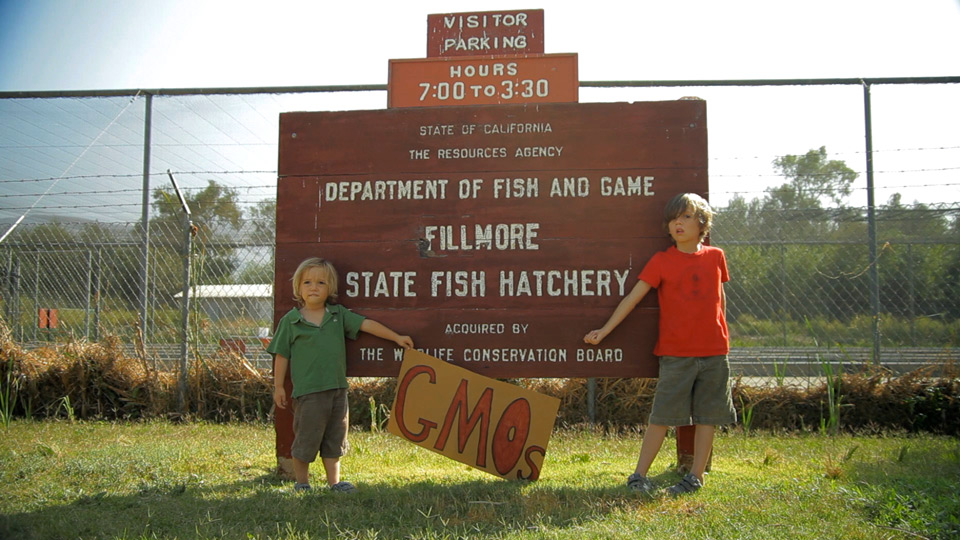
A documentary about genetically modified foods is not supposed to be endearing and funny and lovable! The storyteller in this case is fun-loving dad Jeremy Seiffert, and he pulled me in right away with his charm and earnest hopes for his two young boys. As a mother of two young kids, I connected right away with him and trusted that he was going to tell me a good story... and he did. Jeremy and his young family set out on a road trip to learn more about GMOs. Along the way he meets with farmers, scientists and others who are impacted by industrial agriculture. Sure, I felt outraged by the lack of information regarding GMOs and looming safety concerns and how corporate greed trumps the common good, but I was ultimately cheered on by Jeremy, his family and the people he met along his journey who are working to label and restrict the use of GM foods. The message is hopeful.
Maya Angelou once said, “People will forget what you said, people will forget what you did, but people will never forget how you made them feel.” The transformative power of storytelling and its potential to inform us and inspire us is essential as we fortify ourselves and unite our communities in an effort to make change happen. We need to feel good about it.
A Celebration of Chef Edna Lewis & Sugar Beet Co-op
The culinary team at Inspiration Kitchen is preparing a 4-course menu inspired by the work of Chef Edna Lewis and wine and beer will be served, as well. Edna Lewis was born in a small settlement called Freetown in 1916, one of eight children. The farm had been granted to her grandfather, a freed slave. Growing, gathering and preparing food was more than just sustenance for the family; it was a form of entertainment. In her cookbook, "The Taste of Country Cooking" Edna recalls her childhood memories of seasonal celebrations with her family through recipes, which read like love letters. The proceeds of this unique event will benefit The Sugar Beet Co-op.
Saturday, October 5, 2013 - 6:00pm until 10:00pm Get Tickets Online Here
Chef Kocoa Scott-Winbush and 4 guest performers will read excerpts of Chef Edna's writings from two of her highly acclaimed cookbooks, "The Taste of Country Cooking" and "In Pursuit of Flavor." Readings will be paired with the violin virtuosity of Samuel "Savoirfaire" Williams, a local, classically trained jazz violinist.
The proceeds of this unique event will benefit The Sugar Beet Co-op, a volunteer organization that provides educational experiences that celebrate local food. From canning classes to The Edible Garden Tour, The Sugar Beet Co-op has reached over 3000 people in 18 months with positive and practical information about sustainable food choices that support local farmers, strengthens our community and feeds our bodies and souls.
Inspiration Kitchens (right by the Garfield Park Conservatory) 3504 W. Lake St Chicago, IL 60624
Going Green in a Condo
Ever since she was a child, Lisa Kozinski, owner of an Oak Park condo you can visit on the 2013 Green Living & Learning Tour on September 28, has entertained thoughts some of us might be afraid to face, such as, “What if the water stopped running through the pipes? How would we get water then?” As she got older, that line of thinking “intensified” when she fed the thoughts with research, films, and books such as Barbara Kingsolver’s Animal, Vegetable, Miracle: A Year of Food Life. From Kingsolver’s book (summarized at bottom), Lisa was led to read others in which authors shared their similar beliefs, that “we are heading for a time when going to a fully-stocked grocery store in any season will become a thing of the past,” she said, adding, “We need to equip ourselves with the skills it will take to survive when such a time occurs.” Lisa has found this kind of thinking “oddly comforting” – primarily because it confirmed her earlier thoughts and gave them framework and purpose. She says she felt a sense of urgency to make the changes in her life that would address these ideas.
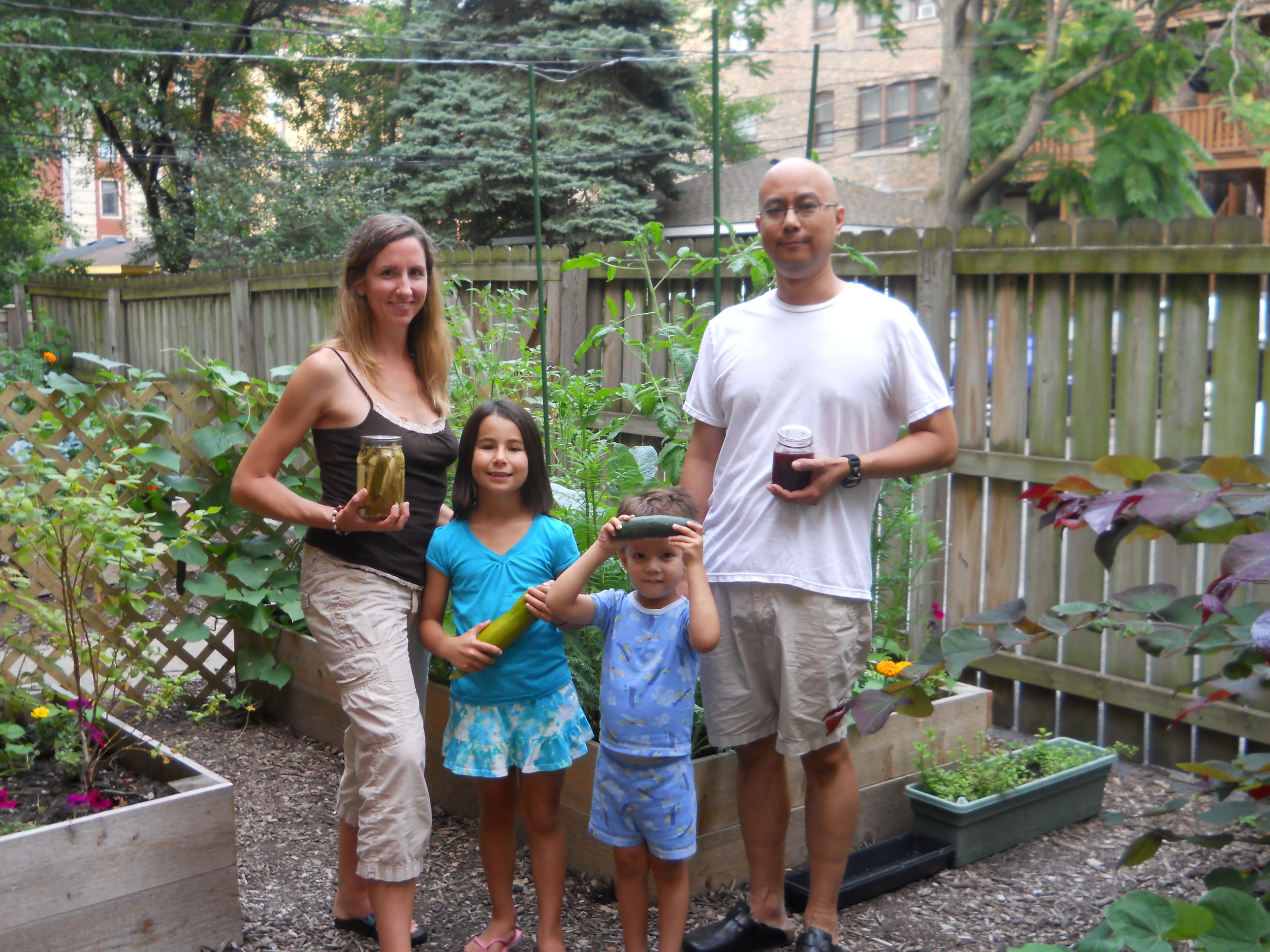 First and foremost, Lisa (pictured at left in her garden with her family) decided to use the “tiny bit of useless backyard behind [her] six-flat” to grow some of her own food. It took some planning, as it was nothing more than a muddy patch of land where, she reports, “nothing would grow and was used mostly as a dog run”. When the dog (and the neighbor) moved out, Lisa seized her chance, digging drainage ditches and spreading mulch over the top with other neighbors in the building. "We then built four raised beds and filled them with soil," she said. "At the same time, I had to figure out what I could even grow in my backyard, since my readings suggested that any garden with less than six hours of direct sunlight would not produce anything. As I observed the sunlight patterns, we were lucky if we got three-to-four hours of direct light a day. I was undaunted, however, and decided to try a variety of greens, tomatoes, cucumbers, beans and even some berries. As with any experiment, not all of the plants have thrived, but many have done so well, that I now pronounce my garden a success.”
First and foremost, Lisa (pictured at left in her garden with her family) decided to use the “tiny bit of useless backyard behind [her] six-flat” to grow some of her own food. It took some planning, as it was nothing more than a muddy patch of land where, she reports, “nothing would grow and was used mostly as a dog run”. When the dog (and the neighbor) moved out, Lisa seized her chance, digging drainage ditches and spreading mulch over the top with other neighbors in the building. "We then built four raised beds and filled them with soil," she said. "At the same time, I had to figure out what I could even grow in my backyard, since my readings suggested that any garden with less than six hours of direct sunlight would not produce anything. As I observed the sunlight patterns, we were lucky if we got three-to-four hours of direct light a day. I was undaunted, however, and decided to try a variety of greens, tomatoes, cucumbers, beans and even some berries. As with any experiment, not all of the plants have thrived, but many have done so well, that I now pronounce my garden a success.”
At last year’s Green Living and Learning Tour, Lisa took a pledge to start canning. While she knew “nothing” about how to do it, she says she “could hardly wait for the spring and summer to arrive.” She is pleased to be canning her own jams, tomatoes and pickles, knowing that she would be able to use them all year long without fear of BPA and knowing that what she preserves comes from local farmers in season. “I still have a lot to learn, and each year I will take something new away, trying new recipes and methods and tweaking them to my taste buds. It has been an adventure that I look forward to continuing each and every summer!”
Visit Lisa, her family and the garden in back of their condo during the Green Living & Learning Tour in Oak Park and River Forest on Sept. 28th. After checking out the raised bed gardens, composting and rain barrel in the tiny back yard, visitors can head upstairs where Lisa will be discussing various methods of home food preservation, including canning and fermentation. Under the umbrella of canning, we will talk about making fruit jams and pickling vegetables. As for the far more ancient method of lacto-fermentation, we will discuss how to make milk kefir, yogurt, and fermented vegetables, such as pickles and sauerkraut. There are many nutritional as well as environmental benefits to both of these methods of home food preservation.
For more information about the event, including registration information for all 18 sites, visit the tour page at Green Community Connections.

Since its release in May 2007, Animal Vegetable, Miracle has helped launch a modern transition in America’s attitudes toward food. In this lively account of a family’s locavore year on their farm in Southern Appalachia, Barbara Kingsolver and her coauthors unearth the secret lives of vegetables and the unexpected satisfactions of knowing their food producers — and sometimes their dinner — on a first-name basis. Animal, Vegetable, Miracle: A Year of Food Life makes a passionate case for putting the kitchen back at the center of family life and diversified farms at the center of the American diet. - from the book’s website



